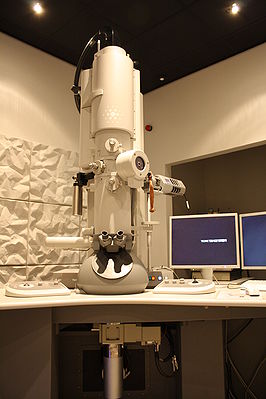LabAdviser/314/Microscopy 314-307/TEM/T20: Difference between revisions
mNo edit summary |
|||
| Line 13: | Line 13: | ||
The Tecnai T20 is a transmission electron microscope equipped with a thermionic electron source with a Lab6 filament and acceleration voltages that can vary between 80-200 kV. It has the FEI super-twin (S-Twin) pole piece with a pole piece gap of 5.2 mm (Cs about 1.35 mm). This gives the microscope a resolution @ 200 kV of 1.4 Å in TEM mode. Other tecniques available on the microscope are scanning transmission electron microscopy (STEM, resolution 10 Å) with a high-angle annular dark-field detector (HAADF). Additionally, it is equipped with retractable cryo plates, which makes it ideal for cryo experiments.<br /> | The Tecnai T20 is a transmission electron microscope equipped with a thermionic electron source with a Lab6 filament and acceleration voltages that can vary between 80-200 kV. It has the FEI super-twin (S-Twin) pole piece with a pole piece gap of 5.2 mm (Cs about 1.35 mm). This gives the microscope a resolution @ 200 kV of 1.4 Å in TEM mode. Other tecniques available on the microscope are scanning transmission electron microscopy (STEM, resolution 10 Å) with a high-angle annular dark-field detector (HAADF). Additionally, it is equipped with retractable cryo plates, which makes it ideal for cryo experiments.<br /> | ||
On the analytical side, the microscope is equipped with an Oxford X-Max 80T SDD X-ray detector for Energy Dispersive X-ray (EDS) spectroscopy and a Gatan Tridiem 863 imaging filter allowing for electron energy-loss spectroscopy (EELS) and energy-filtered imaging (EF-TEM). For imaging, the microscope is equipped with TVIPS XF416 | On the analytical side, the microscope is equipped with an Oxford X-Max 80T SDD X-ray detector for Energy Dispersive X-ray (EDS) spectroscopy and a Gatan Tridiem 863 imaging filter allowing for electron energy-loss spectroscopy (EELS) and energy-filtered imaging (EF-TEM). For imaging, the microscope is equipped with TVIPS XF416 CMOS (4096x4096 px) before the the energy filter and a GATAN Ultrascan US1000 (2048x2048 px) after the energy filter.<br /> | ||
== TEM Schematic == | == TEM Schematic == | ||
Revision as of 09:54, 1 December 2020
Feedback to this page: click here

FEI Tecnai T20
DTU Nanolabs Tecnai T20 is a transmission electron microscope (TEM) used for performing both conventional imaging and diffraction, high resolution and scanning transmission microscopy (STEM) measurements. It is a versatile instrument, ideal for studying a wide range of general and advanced materials, soft matter, composites, etc. The microscope is equipped to carry out chemical analysis as well as Cryo-TEM for soft materials.
The Tecnai T20 is a transmission electron microscope equipped with a thermionic electron source with a Lab6 filament and acceleration voltages that can vary between 80-200 kV. It has the FEI super-twin (S-Twin) pole piece with a pole piece gap of 5.2 mm (Cs about 1.35 mm). This gives the microscope a resolution @ 200 kV of 1.4 Å in TEM mode. Other tecniques available on the microscope are scanning transmission electron microscopy (STEM, resolution 10 Å) with a high-angle annular dark-field detector (HAADF). Additionally, it is equipped with retractable cryo plates, which makes it ideal for cryo experiments.
On the analytical side, the microscope is equipped with an Oxford X-Max 80T SDD X-ray detector for Energy Dispersive X-ray (EDS) spectroscopy and a Gatan Tridiem 863 imaging filter allowing for electron energy-loss spectroscopy (EELS) and energy-filtered imaging (EF-TEM). For imaging, the microscope is equipped with TVIPS XF416 CMOS (4096x4096 px) before the the energy filter and a GATAN Ultrascan US1000 (2048x2048 px) after the energy filter.
TEM Schematic
A general schematic of a transmission electron microscope can be found here
Sample holders
The default specimen holder for the T20 is called Single-Tilt (FEI ST) and it is always present in building 314 Prep Room1.

The lab has also other specimen holders used for various application e.g. heating (furnace and MEMS-based), cooling, biasing and tomography. For information on the various specimen holders see HERE
Who may operate the Tecnai T20
Anybody in need of a TEM microscope is welcome to apply for access to our facility by submitting an Access Request Form .Shortly after your ARF has been received you will be contact by the microscopy support team in order to set up a meeting to further discuss your application.
In order to be authorised to use the Tecnai T20 you must complete the Tecnai training with consists of a theoretical lecture and 3 practical sessions of 4 hours each.
Due to the similarity of the basic operations on a Tecnai TEM and a Titan TEM, a Tecnai trained user can receive additional training and progress in using a Titan TEM.
When you have demonstrated a high level of familiarity with the Tecnai TEM you will be authorized and allowed to book it via our booking system called LabManager.
Booking
Booking on the T20 is done by the users in accordance to the booking rules. Booking rules can be found in LabManager under "Documents" for the T20.
Further information
Calibration
- Magnification calibration cameras
- Collection angles GIF
- Convergence angles STEM
Process information
The following techniques and processes are available on the microscope (list isn't complete):
Techniques:
Tips and Tricks
Here you can find some help to solve small issues on the microscope. Let us know, if you have other suggestions.
Reference material
Books:
L. Reimer, Transmission Electron Microscopy - Physics of image formation and microanalysis (Springer, 1997).
David B. Williams, C. Barry Carter, Transmission Electron Microscopy - A Textbook for Materials Science (Springer, 2009).
Online Material:
Tutorials in Transmission Electron Microscopy by John Rodenburg
